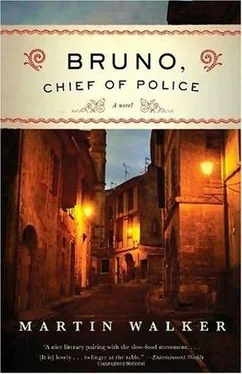Martin Walker - Bruno, chief of police
Здесь есть возможность читать онлайн «Martin Walker - Bruno, chief of police» весь текст электронной книги совершенно бесплатно (целиком полную версию без сокращений). В некоторых случаях можно слушать аудио, скачать через торрент в формате fb2 и присутствует краткое содержание. Жанр: Полицейский детектив, на английском языке. Описание произведения, (предисловие) а так же отзывы посетителей доступны на портале библиотеки ЛибКат.
- Название:Bruno, chief of police
- Автор:
- Жанр:
- Год:неизвестен
- ISBN:нет данных
- Рейтинг книги:3 / 5. Голосов: 1
-
Избранное:Добавить в избранное
- Отзывы:
-
Ваша оценка:
- 60
- 1
- 2
- 3
- 4
- 5
Bruno, chief of police: краткое содержание, описание и аннотация
Предлагаем к чтению аннотацию, описание, краткое содержание или предисловие (зависит от того, что написал сам автор книги «Bruno, chief of police»). Если вы не нашли необходимую информацию о книге — напишите в комментариях, мы постараемся отыскать её.
Bruno, chief of police — читать онлайн бесплатно полную книгу (весь текст) целиком
Ниже представлен текст книги, разбитый по страницам. Система сохранения места последней прочитанной страницы, позволяет с удобством читать онлайн бесплатно книгу «Bruno, chief of police», без необходимости каждый раз заново искать на чём Вы остановились. Поставьте закладку, и сможете в любой момент перейти на страницу, на которой закончили чтение.
Интервал:
Закладка:
The second letter was a complaint that a neighbour was putting a new window into an old barn without planning permission, and in such a way that it would overlook other houses in the village.
The third letter, however, was potentially serious. It concerned that incorrigible drunk Lйon, who had been fired from the amusement park for misplacing Marie-Antoinette on the guillotine and cutting her in half rather than just decapitating her, much to the horror of the watching tourists. They were even more appalled when he fell drunkenly on top of her. Now Lйon was reported to be working au noir for one of the English families who had bought an old ruin and had been persuaded that Lйon could restore it for them, payment in cash and no taxes or insurance.
He sighed. He wasn’t sure whether to warn Lйon that somebody was probably reporting him to the tax office, or to warn the English family that they were wasting their money. Probably he’d do both, and tell the English about the system whereby they could pay a part-time worker legally and cheaply, and still have the benefit of workers’ insurance. Lйon had a family to support, so Bruno had better get him onto the right side of the Sйcu. He checked the address where he was supposedly working, out in the tiny hamlet of St Fйlix, where he had had a report of cheeses being stolen from a farmer’s barn.
He looked again at the letter about the offending window. That was St Fйlix as well; mon Dieu, he thought, a crime wave in a hamlet of twenty-four people. He sighed, grabbed his hat, phone and notebook, plus a leaflet on the legal employment of part-time workers, and went off to spend the rest of the day in the routine work of a country policeman. Halfway down the stairs he remembered that he would need his camera to photograph the window. Fully burdened, he went out to his van, thinking glumly that Isabelle would not be very impressed if she knew how he usually spent his days.
Three hours later he was back. The English family spoke almost no French, and his English was limited, but he impressed upon them the importance of paying Lйon legally. He would leave it to them to discover the man’s limitations. The owner of the allegedly offending window had not been at home, but Bruno took his photographs and made his notes for a routine report to the Planning Office. The affair of the stolen cheeses had taken most of his time, because the old farmer insisted that somebody was destroying his livelihood. Bruno had to explain repeatedly that since the cheeses were homemade in the farmhouse, which fell well short of the standards required by the European Union, they could not be legally sold, and thus they had to be listed as cheeses for domestic consumption in his formal complaint of a crime. Then he had to explain it all over again to the farmer’s wife. She finally understood when he pointed out that the insurance company would seize the chance to refuse to pay for the theft of illegal cheeses.
In his office, the phone was ringing. He lunged and caught it just as camera, keys and notebook tumbled from his grip onto the table. It was the sous-officier from the Military Archives.
‘This name Boudiaf,’ the old man said. ‘The name you gave me was Hussein, and for that we have no trace. But we do have a Mohammed Boudiaf in the Commandos d’Afrique and his file. He was a corporal, enlisted in the city of Constantine in 1941, joining the Tirailleurs. He then volunteered for the Commando unit in ’43, and on the recommendation of his commanding officer he was accepted. He took part in the Liberation, and was killed in action at Besanзon in October of 1944. No spouse or children listed, but a pension was paid to his widowed mother in Oran until her death in 1953. That’s all we have, I’m afraid. Does that help?’
‘Yes, indeed,’ said Bruno automatically. ‘Does the file list any siblings or other relatives?’
‘No, only the mother. But I think we might assume that Corporal Mohammed Boudiaf was a relative of your Hussein Boudiaf. Now I know it’s Hamid al-Bakr that you are interested in, but there is a coincidence here. Al-Bakr joins the unit in August ’44 in an irregular way, a unit where his acceptance would have been made a lot easier by Corporal Mohammed. Is there a possibility of a name change here?
It’s just speculation, but in cases like this we often find that the new recruit had some good reason to want to change his name when he enlisted. They do it all the time in the Legion, of course, but it’s not uncommon in other branches of the service. If your man al-Bakr was originally called Boudiaf and wanted to change his name, no easer way than to join a unit where his brother or his cousin was already well installed.’
‘Right, thank you very much. If we need copies of this for the judicial proceedings, may I contact you again?’
‘Of course, young man. Now, did you receive my fax of the pay book photo?’ Bruno checked the fax machine. It was there, the first two pages of an Army pay book, featuring a passport-sized photo of a young man known to the French Army as Hamid al-Bakr. Beneath it were two thumbprints, an Army stamp, and on the previous page the details of name, address, date and place of birth. The address was listed as Rue des Poissoniers, in the Vieux Port of Marseilles, and the date of birth was given as 14 July 1923.
‘Yes, it’s here. Thank you.’
‘Good. And again, well done in that brawl of yours. We need more policemen like you. I presume you are an old soldier.’
‘Not that old, I hope. But yes, I was in the combat engineers.’
‘You were in that nasty business in Bosnia?’
‘That’s right. How did you guess?’ ‘I couldn’t resist looking up your file. You did well, young man.’
‘I was lucky. A lot of the lads were not.’
‘Feel free to call on me any time, Sergeant Courrиges. Goodbye.’
His ear was damp with sweat when he removed the phone. He focused on the notepad in front of him and the two photos. Hamid al-Bakr of the French Army was the spitting image of Hussein Boudiaf, the footballer. Could they be one and the same person? That would explain Momu’s surprise at the photograph and Momu’s surprise had been real. If Hamid had changed his name, why had he done so? What was he so intent on covering up that he hid his real name from his own son? And could this secret of the past explain Hamid’s murder, nearly sixty years after the young football player decided to join the Army and change his name?
He could talk this through with Isabelle this evening, he thought, smiling at the prospect, then admitting to himself that there probably wouldn’t be a lot of time spent talking about crime and theories – or talking about anything. He remembered the way she had kissed him in the cave, just a millisecond before he was going to kiss her, and then that sweet and trusting way she had slipped his hand onto her warm breast… The phone broke into his reverie.
‘Bruno? It’s Christine, calling from Bordeaux. I’m at the Moulin archive and I think you had better get down here yourself. There’s nothing about Hamid al-Bakr that I could find, but we have certainly tracked your Villanova and that new name you gave me, Hussein Boudiaf. It’s dynamite, Bruno.’
‘What do you mean, dynamite?’
‘Have you ever heard of a military unit called the Force Mobile?’
‘No.’
‘Look, Bruno, you’re not going to believe it unless you come and see this stuff for yourself. Your men Villanova and Boudiaf were war criminals.’
‘War criminals? Where? How do you mean?’
‘It’s too complicated to explain on the phone. There’s so much background. What I suggest is that you go to Pamela’s house and ask her to give you a couple of my books that she’ll find on the desk in my room. Have you a pen? I’ll give you the titles. Look up the Force Mobile in the indexes. The first one is Histoire de la Rйsistance en Pйrigord by Guy Penaud, and the other one is 1944 en Dordogne by Jacques Lagrange. I’ll call Pamela and get her to look them out for you, but you have to read the bits about the Force Mobile and call me back. I- Dammit, my phone’s running out of juice. I’ll recharge it and wait for your call. And my hotel in Bordeaux is the Hotel d’Angleterre, easy to remember.
Читать дальшеИнтервал:
Закладка:
Похожие книги на «Bruno, chief of police»
Представляем Вашему вниманию похожие книги на «Bruno, chief of police» списком для выбора. Мы отобрали схожую по названию и смыслу литературу в надежде предоставить читателям больше вариантов отыскать новые, интересные, ещё непрочитанные произведения.
Обсуждение, отзывы о книге «Bruno, chief of police» и просто собственные мнения читателей. Оставьте ваши комментарии, напишите, что Вы думаете о произведении, его смысле или главных героях. Укажите что конкретно понравилось, а что нет, и почему Вы так считаете.












